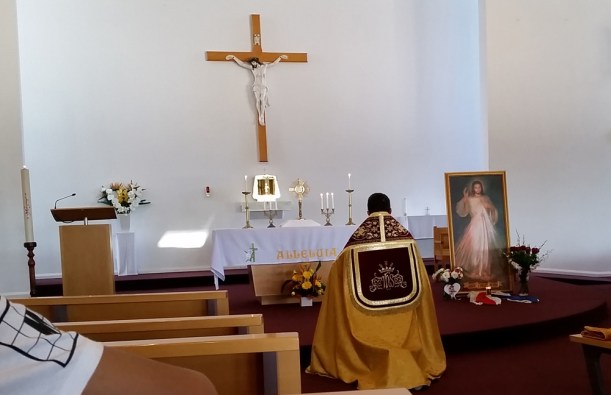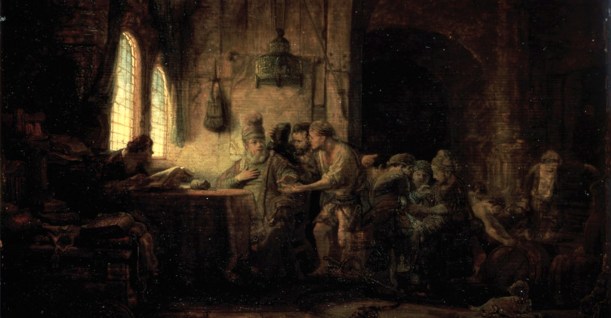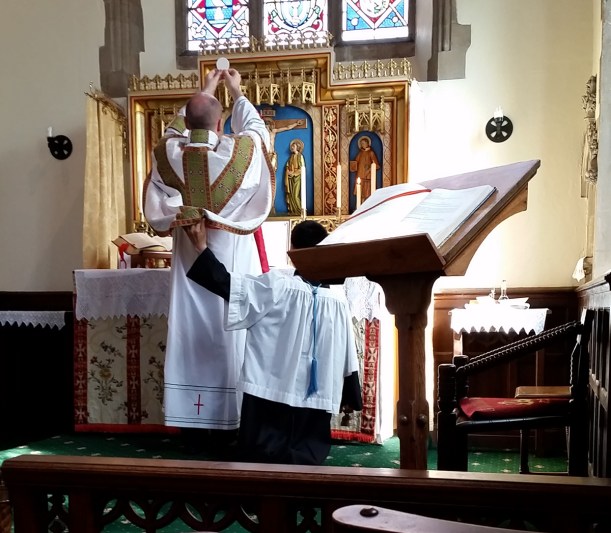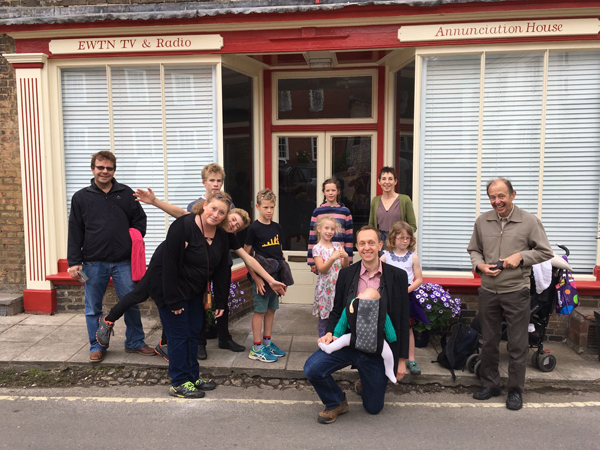
Divine Mercy Holy Hour, 2017, at St Andrew’s Parish, Clarkson.
What can one say about the Feast of Divine Mercy that hasn’t been said before elsewhere? As I was mulling this question over, wondering what to write, I remembered a story of Divine Mercy that I had witnessed personally. The thing about the Resurrected Christ is that He is alive and acting in the world; He isn’t merely a figure of historical interest. He promised to be ‘with us always’, so if we are on the alert for His action, we will see his signs and guidance all over the place. In telling this story, I will change the names of a few people to protect their identities.
Several years ago I came across a man – let’s call him Józef – who was of Polish heritage and had been baptised a Catholic, but had fallen away from the practice of his faith. This man became the subject of my prayers from time to time. I could see that he was a good man, a great contributor to the community, and heavily involved in volunteering, but it made me sad to think that he had not quite realised the potential of the Holy Spirit given to him at baptism. If only we could understand the abundant life God offers us, we would all want to enter into his joy. But most of us live on a somewhat superficial level, getting caught up in the hustle and bustle of life without considering the question, “What must I do to be saved?” and getting to know their Creator. I’m not saying that most people are bad; all I am saying is that we are rather careless about our final end and purpose and this puts our souls in jeopardy. So I used to pray that God would find a way to save Józef and bring him into relationship with Him.
Enter Divine Grace. Grace has a funny way of showing itself. In this case, Józef developed early onset dementia. I know that dementia doesn’t sound like a gift from God, but when one doesn’t take the opportunities God gives as Plan A, sometimes God has to chase after us with a Plan B. God’s aim is to help us make it to heaven, but He can’t compel us, or our free will is compromised, so he sometimes resorts to steering us by slow degrees, especially if we are assisted by someone praying for us at the same time. I had visited Józef at his home at some point during this time and asked if he would like to see a priest, but his family declined. In the meantime, I kept praying for him – not regularly, I must admit, but every now and then, I would dart an intercession his way. Well, after a few years of slow deterioration at home, Józef had to be moved to a local nursing home which happened to be run by a Christian denomination.
Now the local Catholic priest used to attend this aged care facility once a week to offer Mass, and every Wednesday, the Catholic residents (and there were quite a few) would be wheeled in to the activity room to participate in the Mass – among them Józef. By now Józef’s dementia had progressed to a point where his former resistance to receiving Holy Communion had been replaced by an openness and even an eagerness. Perhaps some mental barriers had been dislodged. How much Józef understood and how much assent of the will was involved God alone knew. I remember praying at this time, ”Lord, Józef is going rapidly downhill. Please give me an opportunity to pray the Divine Mercy prayer with him before he dies.”
Now why would I ask this? Well, one of the things that Our Lord revealed to St Faustina during her mystical experiences, was this:
Encourage souls to say the Chaplet which I have given you (1541). Whoever will recite it will receive great mercy at the hour of death (687). When they say this Chaplet in the presence of the dying, I will stand between My Father and the dying person, not as the just Judge but as the Merciful Saviour (1541). Priests will recommend it to sinners as their last hope of salvation. Even if there were a sinner most hardened, if he were to recite this Chaplet only once, he would receive grace from My infinite mercy (687). I desire to grant unimaginable graces to those souls who trust in My mercy (687). Through the Chaplet you will obtain everything, if what you ask for is compatible with My will. (1731)
I thought, ”If only God can help me pray this prayer with Józef before he dies, there is a chance that he will be saved.”
Anyway, after some years, Józef’s mobility decreased to the point where he became confined to his room. I am ashamed to say that he didn’t receive many visits from the Catholic Church once he was bed-bound, although the nursing home Chaplain used to visit and provide emotional support to the family. So suddenly Józef was no longer receiving Holy Communion, and, as far as I can understand, the priest did not seem to be aware of the situation or in touch with the family.
Enter God’s grace again. The priest was due to take four weeks of annual leave and he obtained permission from the Archdiocese for one of the parishioners to distribute Holy Communion while he was away. The parishioner, a generous-hearted woman, together with a friend, decided to go from room to room, finding all the Catholic residents who were bedbound and not able to attend the Activity Room Masses.
It was while they were doing this that one of them decided to ring me. ”It’s Pat here. I’m phoning you because Father’s away and I don’t know what to do! The Chaplain has told us that Józef has not long to live and he might need the Last Rites!” Fortunately, I had the phone number of the Supply Priest, but – oh no – it was a Monday, priest’s day off! What if Józef died before he’d received an anointing? Praise God, Fr Demetri answered his phone. And what’s more, he wasn’t having a day off; he was in between two funerals. ”Don’t worry. I’ll come up and give him an Anointing after the second funeral,” he said.
In the meantime I was thinking, ”Thank you, Lord, that you have timed this so that I can pray the Divine Mercy Chaplet with Józef. I want You to stand between Your Father and Józef, like you said, not as the just Judge but as the Merciful Saviour.” I planned to pray a Divine Mercy Novena, if possible – nine days, or as long as God might give me. This was what my dear friend, Cathy, did with me before my own husband passed away. So every day after work for that week, I would turn up at Józef’s room to pray out loud or silently by his bed. His family were very kind to me, and allowed me to carry on. But his wife was concerned about Józef. He was not at peace, she said, even though he had had an Anointing.
I wondered what else I could do for Józef – and then I had an inspiration! People with dementia often respond to things that strike a chord with their history from the distant past, rather than more recent times. What about if I could get a Polish priest to come and pray for him in Polish? It so happened that God’s Providence had placed a Polish Deacon in a neighbouring parish, someone whom I already knew, who had a devotion to the Divine Mercy and, what’s more, had just recently returned from a visit to the Shrine of St Faustina. But the neighbouring parish was an active one, the Deacon couldn’t come straight away, and in the meantime, Józef was sliding further downhill. I had already reached Day 4 of the Novena. Was there anything I could do to speed things up? Perhaps they thought I was being a bit too demanding, so I popped a thank you card with a donation in the parish mailbox (a donation which he insisted on returning, by the way) and waited to see what would happen. On the next day, when I visited for Day 5 of the Novena, Józef’s wife said that the young Deacon had been to visit. ”I’m afraid I must have scared him because he arrived at a time when we were all crying and upset. Józef had been so agitated through the course of the day. But then the Deacon prayed with him, and Józef calmed right down. He gave him peace.”
After that, Józef went into a rapid, but peaceful, decline, and he died on Day Seven of the Divine Mercy Chaplet – the number of completion, you could say.
How good was God to dear Józef! Yes, I know his last years were a struggle both for him and his devoted family – but God did these things …
- provided a Priest to give him an Anointing before he passed,
- brought him parishioners to give him Holy Communion in his last days,
- gave him a Chaplain who saw the need for alerting the Catholic Church,
- granted me my wish to pray the Divine Mercy Chaplet for him on his deathbed, and
- arranged for a Deacon to pray him into peace at the last in the language of his childhood.
We just need to see the struggle with God’s eyes, and not our own.









